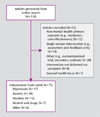A methodological analysis of randomized clinical trials of computer-assisted therapies for psychiatric disorders: toward improved standards for an emerging field
- PMID: 21536689
- PMCID: PMC3607199
- DOI: 10.1176/appi.ajp.2011.10101443
A methodological analysis of randomized clinical trials of computer-assisted therapies for psychiatric disorders: toward improved standards for an emerging field
Abstract
Objective: Computer-assisted therapies offer a novel, cost-effective strategy for providing evidence-based therapies to a broad range of individuals with psychiatric disorders. However, the extent to which the growing body of randomized trials evaluating computer-assisted therapies meets current standards of methodological rigor for evidence-based interventions is not clear.
Method: A methodological analysis of randomized clinical trials of computer-assisted therapies for adult psychiatric disorders, published between January 1990 and January 2010, was conducted. Seventy-five studies that examined computer-assisted therapies for a range of axis I disorders were evaluated using a 14-item methodological quality index.
Results: Results indicated marked heterogeneity in study quality. No study met all 14 basic quality standards, and three met 13 criteria. Consistent weaknesses were noted in evaluation of treatment exposure and adherence, rates of follow-up assessment, and conformity to intention-to-treat principles. Studies utilizing weaker comparison conditions (e.g., wait-list controls) had poorer methodological quality scores and were more likely to report effects favoring the computer-assisted condition.
Conclusions: While several well-conducted studies have indicated promising results for computer-assisted therapies, this emerging field has not yet achieved a level of methodological quality equivalent to those required for other evidence-based behavioral therapies or pharmacotherapies. Adoption of more consistent standards for methodological quality in this field, with greater attention to potential adverse events, is needed before computer-assisted therapies are widely disseminated or marketed as evidence based.
Figures
References
-
- Marks IM, Cavanagh K. Computer-aided psychological treatments: evolving issues. Ann Rev Clin Psychol. 2009;5:121–141. - PubMed
-
- Cuijpers P, Marks IM, van Straten A, Cavanagh K, Gega L, Andersson G. Computer-aided psychotherapy for anxiety disorders: a meta-analytic review. Cogn Behav Ther. 2009;38:66–82. - PubMed
-
- Wright JH, Wright AS, Albano AM, Basco MR, Goldsmith LJ, Raffield T, Otto MW. Computer-assisted cognitive therapy for depression: maintaining efficacy while reducing therapist time. Am J Psychiatry. 2005;162:1158–1164. - PubMed
-
- Proudfoot JG. Computer-based treatment for anxiety and depression: is it feasible? is it effective? Neurosci Biobehav Rev. 2004;28:353–363. - PubMed
-
- McCrone P, Knapp M, Proudfoot JG, Ryden C, Cavanagh K, Shapiro DA, Ilson S, Gray JA, Goldberg D, Mann A, Marks I, Everitt B, Tylee A. Cost-effectiveness of computerized cognitive-behavioral therapy for anxiety and depression in primary care: randomized controlled trial. Br J Psychiatry. 2004;185:55–62. - PubMed
Publication types
MeSH terms
Grants and funding
- T32-DA007238/DA/NIDA NIH HHS/United States
- U10 DA13038/DA/NIDA NIH HHS/United States
- P50 DA009241/DA/NIDA NIH HHS/United States
- T32 DA007238/DA/NIDA NIH HHS/United States
- K05 DA000457/DA/NIDA NIH HHS/United States
- R01 DA015969/DA/NIDA NIH HHS/United States
- R37-DA 015969/DA/NIDA NIH HHS/United States
- L30 DA034338/DA/NIDA NIH HHS/United States
- L30 AA019823/AA/NIAAA NIH HHS/United States
- P50-DA09241/DA/NIDA NIH HHS/United States
- R37 DA015969/DA/NIDA NIH HHS/United States
- U10 DA013038/DA/NIDA NIH HHS/United States
LinkOut - more resources
Full Text Sources
Medical
Miscellaneous



